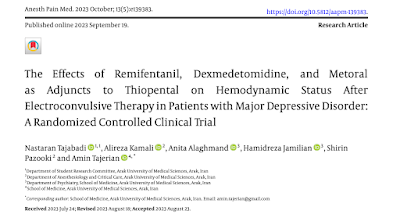Remifentanil, Dexmedetomidine and Metoral Added to Thiopental in ECT: New Study from Iran
Out on PubMed, from investigators in Iran, is this study:
The Effects of Remifentanil, Dexmedetomidine, and Metoral as Adjuncts to Thiopental on Hemodynamic Status After Electroconvulsive Therapy in Patients with Major Depressive Disorder: A Randomized Controlled Clinical Trial.
Background: Depression is a prevalent mental disorder affecting more than 300 million people of all ages globally. Despite being the first-line treatment for depression, antidepressant medications are only effective for 60% - 70% of patients. Electroconvulsive therapy (ECT) is an effective treatment for severe cases, although it can result in short-term side effects.
Objectives: This study aimed to compare the effectiveness of remifentanil, dexmedetomidine, and metoral as premedications for ECT in patients with major depressive disorder (MDD).
Methods: In this prospective double-blinded randomized controlled clinical trial, a total of 120 MDD patients aged 18 - 60 were included. They were randomly assigned to receive remifentanil, dexmedetomidine, or metoral in combination with thiopental before ECT. Hemodynamic responses (mean arterial blood pressure, pulse rate, arterial blood oxygen saturation), seizure duration, recovery time, agitation scores, and patient satisfaction scores (reverse coded) were measured and compared.
Results: Dexmedetomidine exhibited superior hemodynamic control with lower mean arterial blood pressure (P < 0.001) and pulse rate (P < 0.001) than remifentanil and metoral. Patients receiving dexmedetomidine or remifentanil showed reduced agitation (P < 0.001) and better satisfaction than the metoral group (P < 0.001). Remifentanil displayed intermediate outcomes, while metoral exhibited the least favorable results. Seizure duration was not significantly different between the dexmedetomidine and remifentanil groups (P = 0.843).
Conclusions: Dexmedetomidine is considered the most satisfactory group due to the better control of blood pressure, heart rate, and agitation and better patient satisfaction despite the longer recovery time.
Keywords: Dexmedetomidine; Electroconvulsive Therapy; Major Depressive Disorder; Metoral, Thiopental; Remifentanil.
Anesth Pain Med. 2023 Sep 19;13(5):e139383. doi: 10.5812/aapm-139383. eCollection 2023 Oct.PMID: 38028112
The abstract is copied below:
Background: Depression is a prevalent mental disorder affecting more than 300 million people of all ages globally. Despite being the first-line treatment for depression, antidepressant medications are only effective for 60% - 70% of patients. Electroconvulsive therapy (ECT) is an effective treatment for severe cases, although it can result in short-term side effects.
Objectives: This study aimed to compare the effectiveness of remifentanil, dexmedetomidine, and metoral as premedications for ECT in patients with major depressive disorder (MDD).
Methods: In this prospective double-blinded randomized controlled clinical trial, a total of 120 MDD patients aged 18 - 60 were included. They were randomly assigned to receive remifentanil, dexmedetomidine, or metoral in combination with thiopental before ECT. Hemodynamic responses (mean arterial blood pressure, pulse rate, arterial blood oxygen saturation), seizure duration, recovery time, agitation scores, and patient satisfaction scores (reverse coded) were measured and compared.
Results: Dexmedetomidine exhibited superior hemodynamic control with lower mean arterial blood pressure (P < 0.001) and pulse rate (P < 0.001) than remifentanil and metoral. Patients receiving dexmedetomidine or remifentanil showed reduced agitation (P < 0.001) and better satisfaction than the metoral group (P < 0.001). Remifentanil displayed intermediate outcomes, while metoral exhibited the least favorable results. Seizure duration was not significantly different between the dexmedetomidine and remifentanil groups (P = 0.843).
Conclusions: Dexmedetomidine is considered the most satisfactory group due to the better control of blood pressure, heart rate, and agitation and better patient satisfaction despite the longer recovery time.
Keywords: Dexmedetomidine; Electroconvulsive Therapy; Major Depressive Disorder; Metoral, Thiopental; Remifentanil.
The pdf is here.
And from the text:
Of course, ECT anesthesia should be short and simple, and augmentation with the three drugs studied here is completely unnecessary in most cases. (And, by the way, Metoral is metolazone, a diuretic.)
But I think the main message of this paper is that dexmedetomidine has some pretty special properties. I would venture to guess that, when the perfect cocktail of ECT anesthesia meds is agreed upon in the future, dexmedetomidine will be in the mix.








Comments
Post a Comment